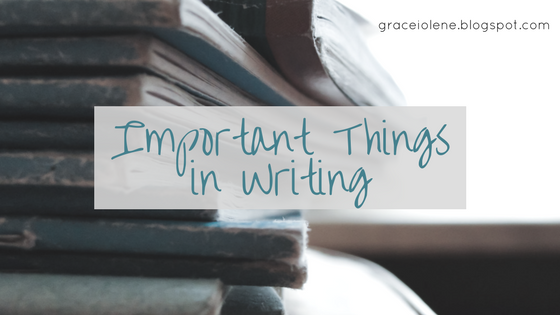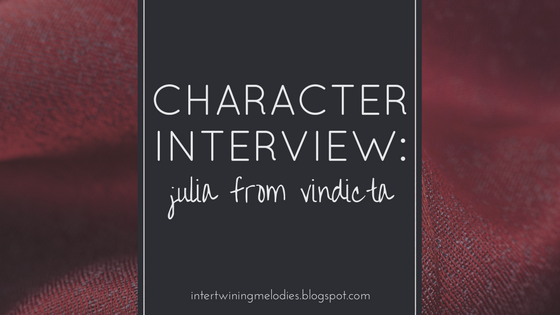Important Stuff in Writing
So! Today is the first time I'm going to (*cough* try *cough*) to share some (*cough* hopefully *cough*) helpful stuff. Let me know if it is helpful or if I should just burn my brain and throw it out the window. Or maybe something less drastic? I don't know.
What is important when you write a story? (Keep in mind, I mainly write fiction/fantasy, so a lot of this stuff is specifically for that, but I'm sure it could be adopted into any genre in some form.) I think the most important things can be categorized into two areas: story and prose.
When your plot gets boring, you get bored, and that's bad. If you have a plot that you're excited about, then you are much less likely to get bored. So, when you're coming up with a plot, make it interesting, and never make it predictable. Feel free to kill and torture characters, even if it makes you feel bad (you'll adjust soon enough XD).
Speaking of characters - those are important as well. Not just your hero, but your villain (very important) and your supporting cast. Don't spend a bunch of time so your hero is super developed, and then leave your villain and supporting cast totally lifeless.
I'm personally a huge fan of a super complex villain. If you've ever seen Thor, Thor: The Dark World, or the Avengers films - Loki is amazing. His character arc, everything is so well done. I want him to be a good guy, and sometimes he is (maybe??) but he's just so confusing and awful and gets me so mad. As you can see...
But in all your development of your main characters (and villain) don't forget the supporting cast! Simple, one-dimensional characters are sometimes okay - but very rarely. Even if your reader never knows that Nancy knows a crazy amount about horses, that she has carrot colored hair and green eyes, or that she grew up in Wichita, Kansas, that background that you know bleeds into your writing that character.
Setting is another huge part of story. This manifests itself in two things you do - worldbuilding and researching. Worldbuilding is basically what you do when you're writing a fantasy, you build a world. You make races (sometimes) to inhabit it, you create geography, a unique culture for your country (or several), and a history for your land.
If you're doing something more along the lines of a historical fiction novel, then reasearch will be a huge part of setting for you. What was it like to live in (insert a time period)? Did they have motor boats in the mid-1920s? You want your story to be as accurate as possible.
Another thing that is included in story is the theme. Now when I say theme, I don't mean a moral like the ones you see at the end of Aesop's fables. I think it's safe to say that you should never outrightly state your theme. But that doesn't mean you shouldn't have one. For example, my Great Wide Somewhere story's theme (at least currently) is that adventure can have unplanned for results, that are often not good.
Again, the theme isn't a huge deal - there are great stories without one. But almost every single meaningful story, the ones that stick with you, have a underlying theme. It's just not stated, which is why you have to look a little to see it.
One more warning about theme: Do not make your story serve the theme/moral. Come up with your plot first, and then see what the theme of the story is - one will often be present, even without you trying to write one in. Don't find a story to fit a theme. That almost always ends up very cheesy.
The most important thing about prose is probably point of view. When you write a story, you can choose from three points of view: first person ("I ran down the street."), second person ("You ran down the street."), or third person ("Sarah ran down the street."). Hardly anyone writes in second person - it is very hard. It's usually third or first person. There are the pros and cons for both. Just make sure you stay consistent!
Next: use the best possible word. The English language has so many words in it that all mean something slightly different. Don't use three words when one word would work the same, or possibly even better. This is especially true when it comes to verbs. For example: "John ran down the street, his feet hitting the pavement very hard." compared to "John ran down the street, his feet pounding the pavement." Better, isn't it?
The final things I would mention about prose are: show, don't tell; and use dialogue well. I may return to these later, but you can see the basic idea of what I want to say in this link about showing vs. telling, and this one about dialogue (specifically dialogue tags).
Whelp! That's it for my first "post in which I attempt to be helpful." Hope it was a little, or at least got you thinking about things that go into your story. I'll try to talk about all these things in a little more depth and detail in the next few months. I'll be back next week with books!! Have a great week, y'all.
~ Anna Iolene
What is important when you write a story? (Keep in mind, I mainly write fiction/fantasy, so a lot of this stuff is specifically for that, but I'm sure it could be adopted into any genre in some form.) I think the most important things can be categorized into two areas: story and prose.
Story
When I say story, I mean a few things. First, the most obvious part of writing a fiction/fantasy story. The plot itself, the thing that drives the story forward. The plot should be several things, but never boring. Never, ever, ever boring. Got it?When your plot gets boring, you get bored, and that's bad. If you have a plot that you're excited about, then you are much less likely to get bored. So, when you're coming up with a plot, make it interesting, and never make it predictable. Feel free to kill and torture characters, even if it makes you feel bad (you'll adjust soon enough XD).
Speaking of characters - those are important as well. Not just your hero, but your villain (very important) and your supporting cast. Don't spend a bunch of time so your hero is super developed, and then leave your villain and supporting cast totally lifeless.
I'm personally a huge fan of a super complex villain. If you've ever seen Thor, Thor: The Dark World, or the Avengers films - Loki is amazing. His character arc, everything is so well done. I want him to be a good guy, and sometimes he is (maybe??) but he's just so confusing and awful and gets me so mad. As you can see...
But in all your development of your main characters (and villain) don't forget the supporting cast! Simple, one-dimensional characters are sometimes okay - but very rarely. Even if your reader never knows that Nancy knows a crazy amount about horses, that she has carrot colored hair and green eyes, or that she grew up in Wichita, Kansas, that background that you know bleeds into your writing that character.
Setting is another huge part of story. This manifests itself in two things you do - worldbuilding and researching. Worldbuilding is basically what you do when you're writing a fantasy, you build a world. You make races (sometimes) to inhabit it, you create geography, a unique culture for your country (or several), and a history for your land.
If you're doing something more along the lines of a historical fiction novel, then reasearch will be a huge part of setting for you. What was it like to live in (insert a time period)? Did they have motor boats in the mid-1920s? You want your story to be as accurate as possible.
Another thing that is included in story is the theme. Now when I say theme, I don't mean a moral like the ones you see at the end of Aesop's fables. I think it's safe to say that you should never outrightly state your theme. But that doesn't mean you shouldn't have one. For example, my Great Wide Somewhere story's theme (at least currently) is that adventure can have unplanned for results, that are often not good.
Again, the theme isn't a huge deal - there are great stories without one. But almost every single meaningful story, the ones that stick with you, have a underlying theme. It's just not stated, which is why you have to look a little to see it.
One more warning about theme: Do not make your story serve the theme/moral. Come up with your plot first, and then see what the theme of the story is - one will often be present, even without you trying to write one in. Don't find a story to fit a theme. That almost always ends up very cheesy.
Prose
Prose is a word that some people don't know what it means exactly... I know I didn't until two or three years ago. Everyone knows what poetry is, right? (I'm assuming everyone said yes - if you don't, go look it up.) Prose is basically the opposite of poetry - just normal writing with no stanzas or rhyming.
Here's a proper definition:
Prose: written or spoken language in its ordinary form, without metrical structure.Maybe that was more helpful than my definition. So, with what prose means out of the way, onto how it is important for your novel/story.
The most important thing about prose is probably point of view. When you write a story, you can choose from three points of view: first person ("I ran down the street."), second person ("You ran down the street."), or third person ("Sarah ran down the street."). Hardly anyone writes in second person - it is very hard. It's usually third or first person. There are the pros and cons for both. Just make sure you stay consistent!
Next: use the best possible word. The English language has so many words in it that all mean something slightly different. Don't use three words when one word would work the same, or possibly even better. This is especially true when it comes to verbs. For example: "John ran down the street, his feet hitting the pavement very hard." compared to "John ran down the street, his feet pounding the pavement." Better, isn't it?
The final things I would mention about prose are: show, don't tell; and use dialogue well. I may return to these later, but you can see the basic idea of what I want to say in this link about showing vs. telling, and this one about dialogue (specifically dialogue tags).
Whelp! That's it for my first "post in which I attempt to be helpful." Hope it was a little, or at least got you thinking about things that go into your story. I'll try to talk about all these things in a little more depth and detail in the next few months. I'll be back next week with books!! Have a great week, y'all.
~ Anna Iolene






Comments
Post a Comment